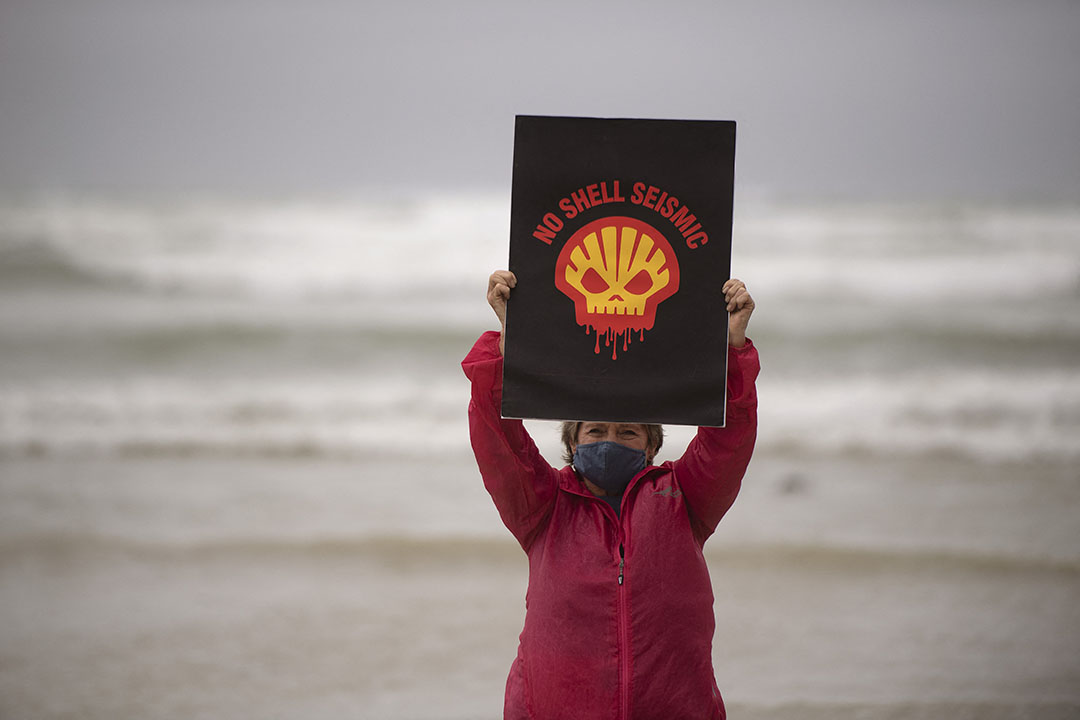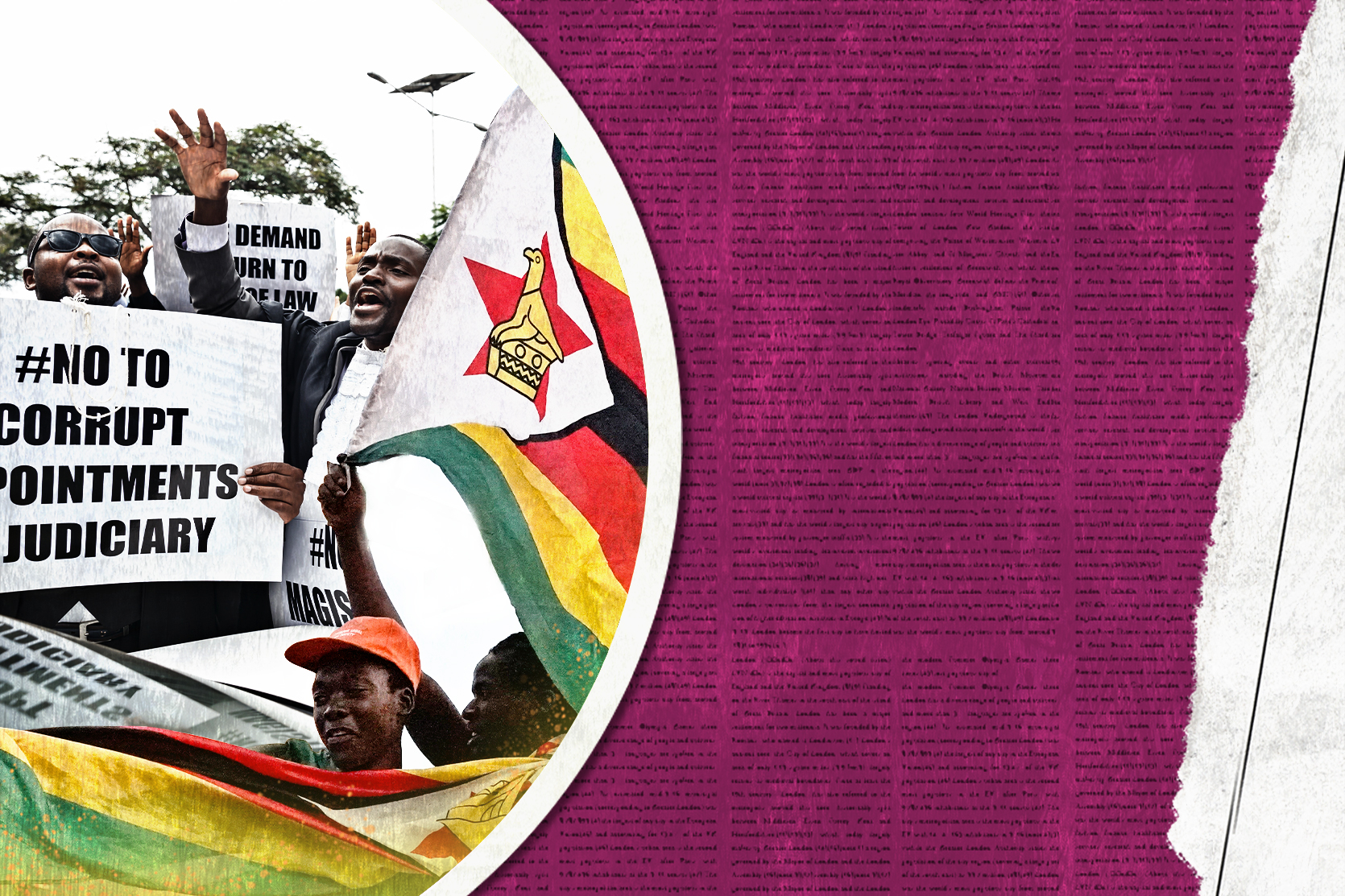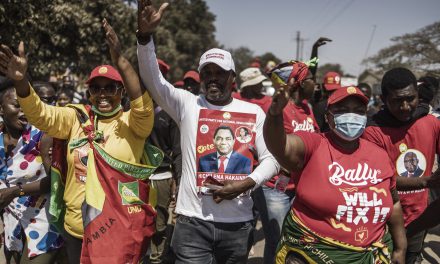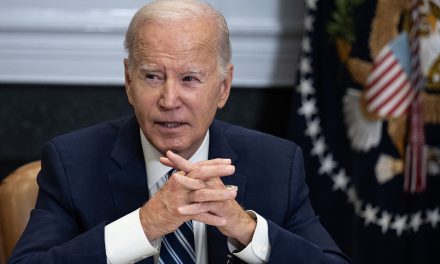
A woman holds a placard on the beach as hundreds of people (not visible) take part in a protest on 5 December 2021 on Muizenberg Beach, Cape Town, against the plan by Dutch oil company Shell to conduct underwater seismic surveys along South Africa’s Wild Coast. Photo: Rodger Bosch/AFP
The 26th Conference of the Parties (COP26) has recently concluded in Glasgow. That there was sunshine in that part of the world was perhaps all the evidence one needs that climate change is real. Humour aside, it is difficult to overstate the fact that a climate catastrophe is imminent unless we manage to slow global temperature rises to below 1.5 Degrees Celsius above pre-industrial levels.
Read More: See our 4th Wicked Conversation series on Climate Change.
Reaching this ambitious goal requires sacrifices and short-term pain. Some countries are not willing to incur this pain. India, one of the largest coal burners on the planet, insisted on language of ‘phasing down’ rather than ‘phasing out’ coal. Nigeria, too, even prior to COP26, has been making the case that countries rich in fossil fuels should not be denied the opportunity to derive development benefits from its exploitations that would fund the transition to clean energy. Indeed, the transition to clean energy will be jagged and will reconfigure global geopolitics in ways that are not yet clear.
Read More: The road to Net Zero by 2050: Unpacking the key trade-offs.
Nonetheless, arguments in favour of continued fossil fuel reliance appear more like arguments for continued easy rents among ruling coalitions than arguments for a ‘just transition’. Elites in existing ruling coalitions of developing countries often have little incentive to switch to clean energy. Within the ‘resource curse’ literature, this is really a continuation of pre-existing political and economic perils of unearned income – unless a country’s governing institutions are strong at the time of discovering oil wealth, rents accrue to ruling elites, entrenching a bargain that consolidates wealth and power for the few at the expense of the many. A corollary impact is that rent availability disincentivizes the ruling coalition from building a broad-based economy with multiple tax sources. This phenomenon is destructive not only because it undermines global efforts to reduce warming; it also perpetuates the unproductive rent-seeking model.
A recent High Court judgment in South Africa brings into sharp relief the kind of dynamics described above. In 2014, oil exploration rights were granted to Royal Dutch Shell (using seismic blasting tests) despite objections lodged at the time. Shell announced earlier this year that it would now exercise those rights and go ahead with blasting off South Africa’s pristine Wild Coast region. An urgent interdict was filed by environmental groups opposed to the activity, on the grounds that the law has changed since 2014 and such activity now requires more stringent adherence to environmental standards. The court dismissed the case, arguing that the applicants had failed to prove reasonable apprehension of irreparable harm and that delay-induced monetary losses to the company could not be justified.
The full text of the judgment is not yet available, but it appears at first glance as if at least three factors are missing that should be considered.
First, whether the blasting is destructive to marine wildlife (at great risk already precisely because of global warming) or not, the extraction of oil appears incompatible with South Africa’s commitment to reduce its greenhouse gas emissions by 42% by 2025, and to be carbon neutral by 2050. The activity is also likely to lock South Africa into a mega project that will saddle the state with debt and expose Shell shareholders to risk of (yet another) stranded asset.
Second, if blasting is in fact destructive to whales and marine ecosystem health (and it’s difficult to comprehend how it would not be), then far greater weight should be placed on this question. A recent paper published in Finance & Development (an International Monetary Fund publication) reports the ecosystem services value of a whale over its lifetime; the carbon sequestration value alone is staggering. It seems highly unlikely that any economic benefit derived from Shell’s activity will be worth the opportunity costs when the latter are correctly evaluated.
Third, in light of the resource curse dynamics indicated above, the governance risks associated with this type of project cannot be ignored. It is well known that the ruling party’s investment arm, the Batho Batho Trust, owns a 47% stake in Thebe Investment Corporation, which in turn owns 28% of Shell Downstream SA. While a different company, technically, from Shell Trading, which performs the exploration and mining, it is difficult in the South African context not to draw pessimistic conclusions. One always has to ask who benefits.
South Africa has an expensive habit of favouring Soviet-style mega-projects (think Medupi and Kusile) at significant financial and planetary costs. These are costs we can ill-afford. While the hypocrisy of wealthier nations preaching to African nations that we should cut emissions can be difficult to stomach, the truth is that we only have one planet. Any projects that risk ecological health, raise temperatures even slightly, and strengthen elite bargains that only benefit elite insiders at the expense of citizens, should be subject to intense scrutiny.
Of course, the question of what a ‘just transition’ entails is not set in stone, and justice must be pursued to ensure the eradication of energy poverty. But that pursuit must not itself undermine intergenerational justice. Pursuing fossil fuel extraction when contra-indicated seems highly unjust in this respect.
To examine this wicked problem more robustly, Good Governance Africa will be launching its fifth Wicked Conversation Campaign in early 2022 on this subject.
We will begin by assessing the nature of the court judgement, how it has read the law and whether the public were indeed adequately informed about the status of silently granted exploration applications. Has good governance been followed? Another court interdict is about to be launched, which we will then examine in a follow-up piece to the first.
Secondly, we dive into the relationship between Shell and the ruling party and the historical political economy context that has informed the current state of play.
Thirdly, we examine the interplay between natural resource governance and environmental concerns. The tension between these two must be well governed. One of GGA’s primary objectives is to ensure that defensible criteria are adhered to when making complex mining rights allocation decisions.
Fourthly, in relation to this tension, it is imperative to attribute appropriate economic value to intrinsically valuable species such as whales (and the ecosystems on which they depend to survive). We explore the literature on this subject and the latest work from the economics discipline to value planetary health more adequately than we have done until now.
Finally, we consider the way in which this deal possesses echoes of other deals in the South African context that may lock us into environmentally and developmentally bankrupting projects.
We look forward to your feedback, as always, as we embark on answering these critical governance questions.
Dr Ross Harvey is a natural resource economist and policy analyst, and he has been dealing with governance issues in various forms across this sector since 2007. He has a PhD in economics from the University of Cape Town, and his thesis research focused on the political economy of oil and institutional development in Angola and Nigeria. While completing his PhD, Ross worked as a senior researcher on extractive industries and wildlife governance at the South African Institute of International Affairs (SAIIA), and in May 2019 became an independent conservation consultant. Ross’s task at GGA is to establish a non-renewable natural resources project (extractive industries) to ensure that the industry becomes genuinely sustainable and contributes to Africa achieving the Sustainable Development Goals (SDGs). Ross was appointed Director of Research and Programmes at GGA in May 2020.











